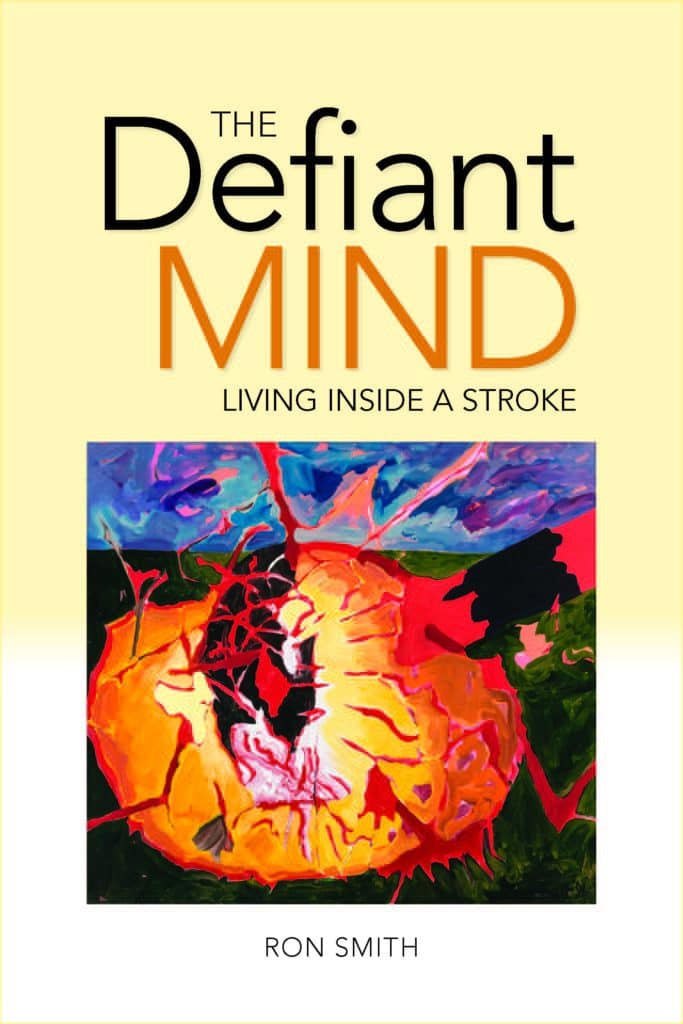When my friend and writing colleague Ron Smith wrote to tell me about his new book, The Defiant Mind, I invited him to write a guest post for this blog. Thank you, Ron, for providing one of the most enlightening and moving articles I’ve had the pleasure to publish. Ron survived a major stroke, and he writes about the experience of the stroke itself as well as his continuing recovery. Here’s just one of the many accolades the book has received:
“The Defiant Mind closed a gap for me . . . it allowed me to understand (and in a way come to peace with) my dad’s stroke all these years later.”
—Elizabeth Takac, Coordinator, Research, Heart and Stroke Foundation

MM: Prior to your stroke, how were you spending your time?
RS: I had recently sold my publishing company and was assisting the new owner with editing: fiction, poetry and nonfiction. I had also just completed a biography of one of Canada’s iconic athletes, a man who had played both football and hockey and the only person to compete in the Stanley Cup and the Grey Cup in the same year. At one time Gerry James, aka ‘Kid Dynamite’, held 18 records in the CFL and had been recruited by the New York Giants. More importantly, I was active, both physically and intellectually.
MM: What did the stroke interrupt?
RS: I had three new writing projects on the go: a sequel to my illustrated children’s story, Elf the Eagle; a novel; and a book of new poems. Within minutes, my literary life came to a halt. Perhaps more disconcerting and disillusioning, my day to day life was in suspension; I was severely disabled and appeared to be inhabiting an alien world.
MM: When did you realize you were having a stroke, and what happened immediately after that?
RS: Like most people, I was slow to realize I was having a stroke. I was in denial. If it hadn’t been for the persistence of my wife and an alert emergency physician, I would not have survived the massive brain attack. Strokes are anything but gentle! In fact, the word stroke is far too gentle; in one sense, suggests a caress. But stroke can also be a blow. I slid off a chair in Emergency and lost any meaningful connection to the world in which I lived. What stands out in my memory is a cacophony of sounds and a hunger for silence and sleep.
MM: What part of your body was affected? How about speech?
RS: My entire right side was paralyzed. Initially I had some difficulty communicating and reading, but I didn’t have aphasia. I suspect my paralysis had more to do with my inability to communicate and read than an assault on and damage to my language centers. My ability to communicate returned relatively quickly when I compare my experience to serious aphasia victims, like Paul West. While I could understand others, my frustration was trying to make them understand me. My speech was slurred, and I had difficulty connecting words with things. Not only was I unable to identify commonplace objects, I didn’t know how to use them.
MM: How much disorientation or frustration did you experience?
RS: Depression is perhaps the one response most stroke survivors experience as a result of their strokes. I no longer felt connected to the world, no longer a part of it. No one could explain what had happened to me or knew what my prospects were. After my stay in the Emergency ward I was sent to a distant, out-of-the-way corner of the Acute ward. Because strokes are so difficult to diagnose, medical personnel are reluctant to risk detailed answers. Physical damage can often be seen, but brain and emotional damage can be impossible to determine. Consequently, disorientation and frustration join hands in response to depression. Self-pity becomes too easy to embrace.
MM: What was helpful/not helpful in the immediate aftermath?
RS: Not much was helpful. The medical response was far too slow, and there was too much dependence on drugs. In retrospect I think treatment protocols were far too rigid; too wrapped up in different scientific methodologies. Treatments do not have to be limited to evidence based, controlled experiments. Stories, if we collect and collate enough of them, might provide reliable information on which to base therapy; that is, use neuro-psychology more.
Most stroke patients receive physiotherapy but not brain therapy. Most stroke patients don’t talk about their stroke experience for fear of being thought crazy. And yet, happily current treatment strategies have improved enormously. My greatest regret is that I wasn’t offered tPA. (For more on tPA, read this fact sheet from the American Stroke Association.)
MM: Did your medical team give you a good idea of the path forward?
RS: Not really. So little is known about the brain, and no one asked me about my thoughts or what was happening to me. As I say, stroke stories are vital to rehabilitation. While you are told that every stroke is different, the protocols for treatment are the same for everybody. This did not make sense!
MM: What did it feel like from the inside when you tried to speak?
RS: I felt detached from the world I knew. In some ways I felt abandoned. When you are handicapped, when you are sitting in a wheelchair, the sense of aloneness and alienation is compounded, and you don’t feel like speaking. No one is listening.
MM: What role did your wife Pat play in communicating with doctors, therapists, etc. and in including you in decision making?
RS: My medical team were caring, very caring, and I include my wife as the central figure on the team because she never gave up on me. She provided constant encouragement and optimism. These two things are critical to recovery. Without support, recovery is unlikely. She insisted I remain positive; that I never give up. She never left me out of any decision making. Her listening was a blessing.
MM: Can you talk about the visualization and meditation exercises that became part of your recovery?
RS: Yes, meditation and visualization became a connection to the person I had been pre-stroke. I learned to travel through my body in my mind. Consequently, I kept insisting on the all-important unity between my physical and mental being. Unfortunately, most of the medical staff were skeptical about what I was achieving through my meditation. When I said I was in my fingertips, they simply nodded sympathetically but with considerable doubt.
This skepticism is one reason why I think stroke survivors are unwilling to tell their stories. No one will believe them. The stories seem far-fetched, sometimes fantastical. Legitimate science is ‘evidence based’; it is not stroke induced hallucination. As a stroke survivor your world no longer conforms to what is accepted as normal behavior.
During my time in rehab I was asked to participate in mirror therapy. I took this exercise seriously, and when my right arm finally moved in response to visualization, I think the therapist was shocked that the therapy she had assigned had actually worked. But for me this was confirmation of what I already knew. I had felt new neural pathways form in my brain, between hemispheres, in response to tapping into my brain.
MM: Was there anything miraculous or wonderful that resulted from the stroke? (I’m thinking of the early memories that surfaced.)
RS: This is an interesting question because, generally speaking, strokes are viewed as totally negative events. And for the most part the damage done is horrific. Yet I experienced a couple of things that were astonishing, if not inspiring.
One night, three to four weeks after I’d had my stroke, I awoke to memories that took me back to when I was eleven months old. Later, when I asked a memory expert from the University of Leeds about my early memories, he was skeptical and suggested that what I had experienced was scientifically impossible. I disagreed with him.
I believe our brains are wired to protect us against overload. My protection, filing system, whatever you want to call it, broke down, and early memories were suddenly exposed. Similarly, my senses became more acute. My hearing and sight both became much more potent or intense. I saw things in a completely different way. Timbers with hard edges were soft and moving, almost as if I could see their molecular structure in motion.
MM: When did you begin to feel that you could get back to your normal activities?
RS: I accepted the fact that I would never return to who I had been. I was confident that a certain degree of rehabilitation would take place, but that I would also be a different person. While I didn’t accept the fact that I would never walk again, I knew I wouldn’t run a marathon. I knew I would write again, but I quickly realized it would be different. I heard the language differently, and I wrote and read at a new and unique pace. Much slower. Part of recovery is recognizing the limitations of the new you as well as embracing the changes.
MM: Do you have any suggestions for people who are caregivers for stroke victims?
RS: Never give up on them. Recovery never ends. There is no time limit on recovery, no two year, one year, six-month limit as the old mantra suggested. Recovery is most often glacial.
MM: How meaningful is it for you to have The Defiant Mind “out in the world”?
RS: My greatest hope for The Defiant Mind is that it will be useful to other stroke survivors and that it will help caregivers understand what a stroke is and what effects it can have on a loved one. Too little is known about stroke and all forms of brain trauma. A stroke is a ‘brain attack’, every bit as severe as a heart attack!
MM: What will caregivers or stroke victims learn from it?
RS: In my travels promoting the book the one complaint I hear over and over from stroke survivors is that no one understands what’s happened to them. Dr. Norman Doidge, author of two books on the brain, suggests that stroke may be the most difficult illness for human beings to cope with, not the worst but the most difficult. This is because a little piece of the stroke survivor’s brain has died, and thus they can never be the same person they once were.
From the start of their stroke until they receive treatment, people lose a million brain cells a minute out of the 100 billion they were born with. This loss can and will likely change how the person thinks and feels in very dramatic ways. And how they see themselves. This is the problem: not only do friends and relatives see you differently, but you can’t see the old you. This loss of identity is pretty traumatic.
Every stroke survivor needs recognition, affirmation, reassurance and massive injections of encouragement. The most powerful elixir, the most effective antidote to the ravages of a stroke, is love. Love. Heavy doses of love and tenderness. And humor. It’s that simple.
For more on the subject read Stroke! The Unexpected Shock of Becoming a Caregiver.
